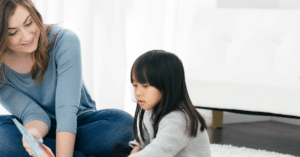I’m so incredibly excited to hear from six amazing SLPs volunteered to share their experience when overcoming a challenge. These posts are filled with practical tips and tricks.
Next up is… Karen! She’s sharing her experience with the auditory verbal approach and the hearing-impaired population.
Tell us about your experience as an SLP! Where did you go to school? How long have you been an SLP? What settings have you worked in? Where do you currently work (e.g., setting, quick overview of caseload)?
I have been an SLP for 17 years. I got my bachelor’s in Speech and Hearing Science from the University of South Alabama and my master’s in Communication Sciences and Disorders from Alabama A & M University. I have had 200+ hours of training in Auditory Verbal Therapy approaches, including hands-on practicum. I did my CFY in a SNF and have also worked in the hospital and outpatient setting. But, my heart belongs in pediatric speech therapy — specifically, working with the hearing-impaired population. I currently work in the public school setting and teletherapy. My caseload consists of hearing impaired, articulation, autism, and language delays. I love working with preschool and early intervention.
Describe the problem you faced. Tell us a little about the situation and how you felt tackling the problem.
I was placed at a school that had two children with cochlear implants. I knew how to do language therapy and articulation therapy, but I felt like I didn’t really know what else they needed to succeed. I asked fellow SLPs and noticed that many didn’t have a lot of information about how to work with hearing impaired (HI) students.
Which resources did you use when solving the problem?
I attended many trainings, conferences, and institutes regarding how to utilize an auditory verbal approach. I also started learning ASL.
What did you try that worked really well?
The auditory verbal techniques that I learned in training produced more progress with the students. I implemented some training with other SLPs, as well.
What did you try that didn’t work?
Trying auditory verbal approaches to profoundly deaf children who also had other disabilities proved to be difficult and challenging with slower progress.
What did you do when things didn’t go as planned?
I modified my strategy to include a hybrid approach using ASL.
What was the end result? Was it what you expected?
The result was less frustration for the student and for myself.
What did you learn?
Sometimes an auditory-only approach isn’t appropriate for a student. It is important to individualize and utilize/modify approaches to achieve maximum progress!




Reader Interactions